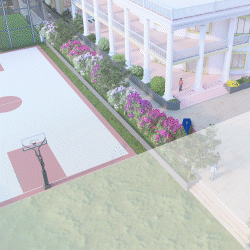Justice for the landless when?
We use Google Cloud Translation Services. Google requires we provide the following disclaimer relating to use of this service:
This service may contain translations powered by Google. Google disclaims all warranties related to the translations, expressed or implied, including any warranties of accuracy, reliability, and any implied warranties of merchantability, fitness for a particular purpose, and noninfringement.


On 9th June 2081, the dozer of Dhangadhi sub-metropolitan city entered Hasanpur settlement and started demolishing houses. People were scattered. Clothes and food were damaged. During the scorching heat, the homeless and landless were forced to live on the streets in front of their dilapidated houses.



The landless people were devastated when the slums were abandoned without alternatives and management under the guidance of the people's representatives who were elected by themselves. In addition, the right to live with dignity, the right to social justice, the right to housing, and the right of Dalits under the fundamental rights mentioned in the constitution were attacked.
They had been living there since 2059. For some time, the sub-metropolitan corporation had been trying to vacate the land of the city development committee. But the victims complained that they could not leave the settlement because they did not have an address to go to. Although the law says that there is a provision to solve the problem of landless and squatters, they say that it is unfair because the people's representatives chased them with dozers.
The incidents of excess, injustice and exploitation are still happening on the poor, landless, squatters, Dalits and marginalized communities. The Dhangadhi incident is just a reference. Article 37 under fundamental rights in the Constitution of Nepal, 2072 ensures the right to housing and provides that every citizen has the right to appropriate housing. In Article 40, in the case of Dalits, the state has "guaranteed" landless Dalits to be provided with land once according to the law, and accommodation for homeless Dalits.
The Eighth Amendment of the Land Act, 2021 was made in order to implement the fundamental rights, and during the implementation of the said Act, the Land Problem Resolution Commission was formed in 2076 and the National Land Commission in 2078. The last commission has been canceled by the government. However, according to the amended Act and Regulations, the main responsibility for land registration and land management of landless Dalits, landless squatters and unorganized residents lies with the local level.
When advocating for the rights of those deprived of land rights, the main problem until a few years ago was the lack of policy management including clear and people-oriented laws, laws, and regulations. Now the political system has improved a lot. Although the work has not been done, instead incidents of uprisings are happening.
On March 9, 2080, the Ministry of Home Affairs issued a circular to the district administration offices to clear the surplus land for the protection of public land. Even after that, there is no investigation on business houses, political parties, organizations or other powerful people who seize and illegally register government and public land under the guise of power and access. Instead, all eyes are on the slums of the landless, squatters and Dalits. They are overpowered.
In the law on land, it is said that 'even if the forest area has been registered in government, public, land or records, it can be registered if it has been occupied for 10 years and the land has been converted into land'. Accordingly, tax collection and other processes are proceeding. According to the statement issued by the Ministry of Home Affairs, 'Public and government owned lands such as Ailani, Sandhisarpan, Gaucharan, Ghat etc. have been registered in their name against the law or have been handed over or handed over to be used or controlled by an organization for a specific purpose or purposes, public and government lands, encroachment by force, encroachment or If it has been confiscated and registered privately, if the registration has been canceled or the right has been transferred to the customs office, then the information about this should be given to the Ministry of Home Affairs or the District Administration Office. This is not to say that the local governments are doing it in an inhumane manner, with no choice but to use bulldozers to force people to live there.
The statement of the Ministry of Home Affairs has been misinterpreted and the citizens who have been living there for generations have been forced to live without proper management and alternatives. The poor, Dalits, landless and squatters are the most affected by this. Human rights have also been violated in this process. In a democratic country, inhumane acts against citizens are shameful and deplorable. Protection of public land, property and resources is also the responsibility of citizens. But in the name of protection, it is not right to forcefully eviction without any choice.
Who is not hurt by the pain of the poor. Those who believe that only the elite should have access to the state and its resources. Those who have power and access. They will not be attracted by such questions. So they applaud those who drive dozers. However, injustice to the poor and arbitrary interpretation of laws and tyranny do not do justice to the poor. The duty and accountability of the state is not fulfilled. A happy Nepali and a prosperous Nepal cannot become a happy Nepali when such inequality, discrimination, and excesses continue.
Therefore, the attention of the federal government, the Ministry of Home Affairs, the Ministry of Land Management, the Ministry of Cooperatives and Poverty Alleviation, the Human Rights Commission and all stakeholders should be directed towards such incidents. Proper relief and systematic rehabilitation should be done for the landless families in distress.
And, in the future, the government at all levels should immediately stop the excesses and inhuman acts like forced uprising without proper management of the citizens. For the time being, the federal government should take the initiative to stop the Utibas that are being done without alternatives and management. Also, the court should help to solve these problems permanently by forming a commission according to the law or opening the way for the old commission to act.
– Neupane is a land rights activist.
 प्रकाशित : असार १९, २०८१ ०७:१४
प्रकाशित : असार १९, २०८१ ०७:१४

 २६.१२°C काठमाडौं
२६.१२°C काठमाडौं


















